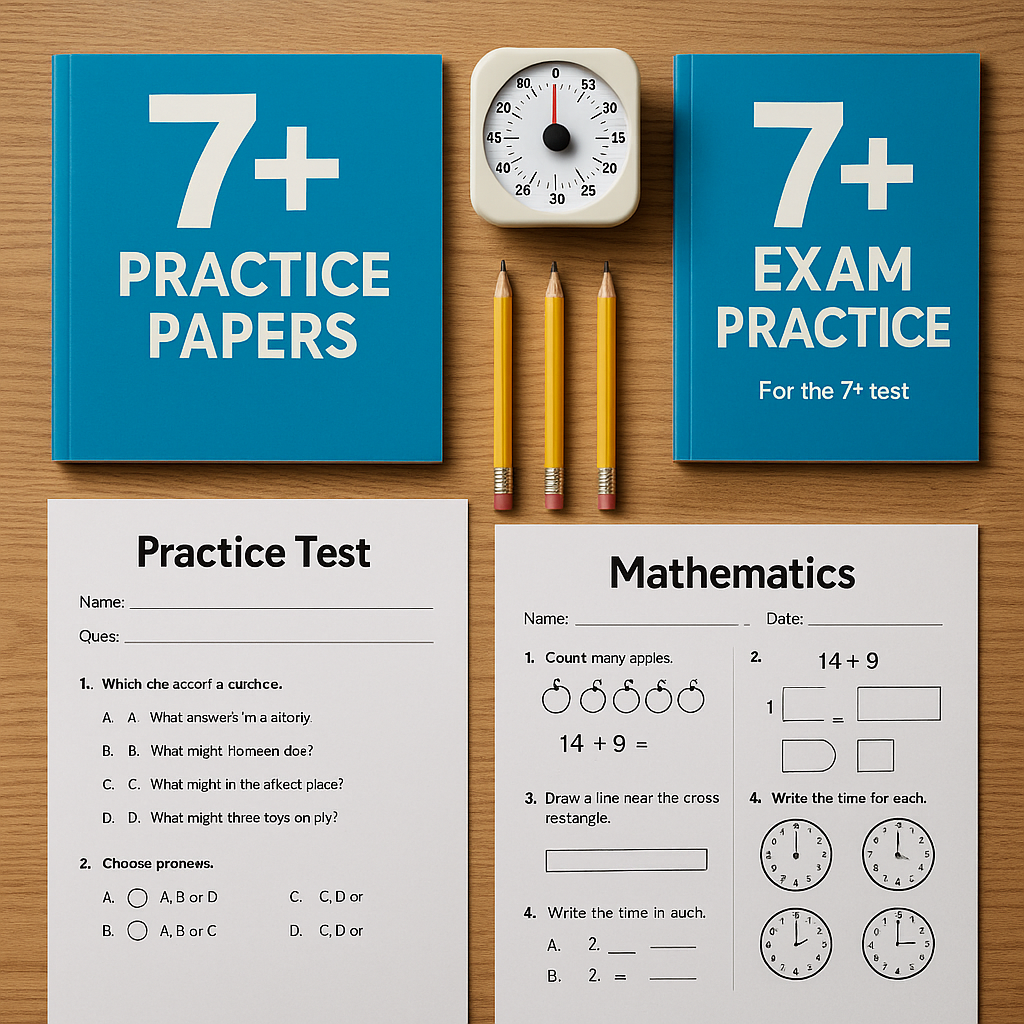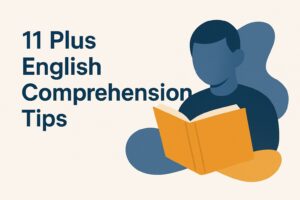
7+ Exam Guide – Everything You Need to Know
7+ Exam Guide
Supporting your child’s journey to academic success with confidence and care
As parents, watching our little ones take their first steps into formal assessments can feel overwhelming. The 7+ exam marks an important milestone in your child’s educational journey, and it’s completely natural to have questions, concerns, and perhaps a few butterflies in your stomach too.
At Academic Success, I’ve walked alongside hundreds of families through this process, and I want you to know that with the right preparation, support, and mindset, your child can approach their 7+ exam with confidence and even excitement. Let me share everything you need to know to make this journey as smooth as possible.
What Exactly Are 7+ Exams?
The 7+ exam is an entrance assessment taken by children in Year 2 (typically age 6-7) who are applying to independent or grammar schools for Year 3 entry. Unlike the more commonly known 11+ exams, 7+ assessments are designed for much younger children, which means they require a completely different approach to preparation.
These exams aren’t about testing advanced academic concepts – they’re about assessing your child’s foundational skills, natural ability, and potential for growth. Schools use them to understand how well children can apply basic literacy and numeracy skills, follow instructions, and demonstrate their thinking processes.
Understanding the 7+ Exam Format
According to the Independent Schools Council, 7+ exams vary significantly between schools.., but here’s what you can typically expect:
Core Subject Areas:
- English: Reading comprehension, basic writing tasks, spelling, and sometimes dictation
- Mathematics: Number work, basic calculations, problem-solving, and mental arithmetic
- Reasoning: Verbal and non-verbal reasoning puzzles (increasingly common)
Assessment Methods:
- Written papers (usually the main component)
- Verbal questioning (mental maths, spelling, memory tasks)
- Creative or practical activities
- Sometimes brief individual interviews
The beauty of 7+ exams is that they’re designed to be accessible to young children. Papers are typically shorter than older age groups, with plenty of visual elements and clear instructions.
When Should You Start Preparing?

This is the question I’m asked most often, and my answer might surprise you. The best preparation for 7+ exams actually begins long before you think about formal tutoring or practice papers.
Early Foundation Building (Reception – Year 1):
- Daily reading together
- Playing number games and counting activities
- Encouraging curiosity and questioning
- Building fine motor skills through drawing and writing
- Developing listening skills and following instructions
Focused Preparation (6-9 months before the exam):
- Introducing age-appropriate practice materials
- Working on exam technique and time management
- Building confidence with unfamiliar question types
- Regular short practice sessions
Intensive Preparation (2-3 months before):
- Mock papers and timed practice
- Addressing any identified weak areas
- Building exam stamina and concentration
- Focusing on confidence and stress management
Remember, younger children learn best through little and often. A happy, confident child who enjoys learning will always perform better than one who’s been over-drilled or stressed.
Subject-by-Subject Preparation Guide

The National Curriculum guidelines from the Department for Education outline expectations for Year 2 students:
English Excellence
Reading Comprehension: Your child should be reading confidently at or slightly above their chronological age level. Focus on:
- Understanding main ideas and details
- Making simple inferences (“Why do you think the character felt sad?”)
- Explaining meanings of words in context
- Discussing story structure (beginning, middle, end)
Writing Skills: At 7+ level, schools look for:
- Clear handwriting and letter formation
- Basic sentence structure with capital letters and full stops
- Ability to write a short story or description (half a page)
- Use of descriptive words and simple connectives
Spelling and Vocabulary:
- Common words appropriate for Year 2 level
- Simple spelling patterns and rules
- Building vocabulary through reading and discussion
Mathematics Mastery
Number Skills:
- Confident counting to 100 and beyond
- Understanding place value (tens and units)
- Addition and subtraction to 20 (and simple beyond)
- Beginning multiplication (2x, 5x, 10x tables)
- Recognising number patterns
Problem-Solving:
- Multi-step word problems
- Money problems (adding coins, giving change)
- Time (reading clocks, calculating duration)
- Measurement and simple data handling
Mental Mathematics:
- Quick recall of number bonds to 10 and 20
- Times tables facts
- Mental addition and subtraction strategies
- Estimation skills
Reasoning and Thinking Skills
Many schools now include reasoning elements to assess logical thinking:
Verbal Reasoning:
- Similarities and differences
- Analogies and word relationships
- Following verbal instructions
- Code-breaking activities
Non-Verbal Reasoning:
- Pattern recognition
- Sequences and series
- Spatial awareness
- Logic puzzles
Creating an Effective Study Schedule

The key to successful 7+ preparation is consistency rather than intensity. Here’s how to structure your approach:
Daily Foundation (15-20 minutes):
- 10 minutes reading together
- 5-10 minutes maths games or number work
- Fun reasoning puzzles or brain teasers
Weekly Focus Sessions (30-45 minutes, 3-4 times per week):
- Monday: English comprehension and writing
- Wednesday: Mathematics practice and problem-solving
- Friday: Reasoning skills and mixed practice
- Sunday: Fun review games and activities
Monthly Assessments:
- Complete a past paper or mock exam
- Identify areas needing attention
- Celebrate progress and improvements
- Adjust preparation focus as needed
Essential Resources and Materials
Books and Workbooks:
- CGP 7+ practice books (age-appropriate and well-structured)
- Bond assessment papers
- School-specific past papers (if available)
- Age-appropriate reasoning puzzle books
Online Resources:
- Educational apps for mental maths practice
- Interactive reasoning games
- Online practice platforms (used sparingly)
Practical Materials:
- Timer for building exam stamina
- Pencils, erasers, and rulers
- Number lines and counting aids
- Flashcards for key facts
Building Confidence and Managing Anxiety
This is perhaps the most crucial aspect of 7+ preparation. A confident child will always perform better than an anxious one, regardless of their academic ability.
Confidence-Building Strategies:
Research from the Child Mind Institute shows that confidence-building strategies:
- Celebrate small wins and improvements
- Focus on effort rather than just results
- Practice positive self-talk (“I can do this!”)
- Use growth mindset language (“I can’t do this yet”)
Managing Pre-Exam Nerves:
- Familiarise your child with exam conditions gradually
- Practice relaxation techniques (deep breathing, positive visualisation)
- Ensure adequate sleep and nutrition
- Keep the morning of the exam calm and routine
Supporting Your Child:
- Stay positive and calm yourself
- Avoid comparing with other children
- Focus on their personal progress
- Remember that this is just one step in their educational journey
Common Mistakes to Avoid
Through my years of experience, I’ve seen families make similar mistakes. Here’s how to avoid them:
Over-Preparation:
- Don’t start too early with formal practice
- Avoid excessive drilling or repetition
- Don’t sacrifice play time and childhood activities
Under-Preparation:
- Don’t assume natural ability is enough
- Avoid leaving everything to the last minute
- Don’t ignore areas of weakness
Pressure and Stress:
- Don’t transmit your own anxiety to your child
- Avoid making the exam seem like a life-or-death situation
- Don’t compare your child’s progress with others
What to Expect on Exam Day
Understanding the practical aspects of exam day can help both you and your child feel more prepared:
Before the Exam:
- Arrive early but not too early (15-20 minutes)
- Bring required items (pencils, erasers, water bottle)
- Use the toilet and wash hands
- Take some deep breaths together
During the Exam:
- Your child will be guided by friendly staff
- Instructions will be clear and age-appropriate
- There may be breaks between different sections
- Staff understand young children’s needs
After the Exam:
- Your child may be tired or emotional
- They might not want to talk about it immediately
- Plan something enjoyable for afterwards
- Remember that you’ve both done your best
Looking Beyond the Results
Whatever the outcome of the 7+ exam, remember that this is just one moment in your child’s educational journey. Schools are looking for potential, and every child develops at their own pace.
If successful:
- Celebrate appropriately but don’t put pressure on future performance
- Continue to support their love of learning
- Remember that the hard work continues
If unsuccessful:
- This doesn’t reflect your child’s worth or future potential
- Many successful people didn’t attend their first-choice schools
- Focus on finding the right educational environment for your child’s needs
Final Thoughts: Trust the Process
As I always tell the families I work with, the 7+ exam preparation process is about so much more than just passing a test. It’s about building your child’s confidence, developing their study skills, and nurturing their love of learning.
Your child is capable of amazing things, and with the right support, encouragement, and preparation, they can approach their 7+ exam with confidence and pride. Remember that you know your child best, and your love and support are the most powerful tools in their academic toolkit.
The journey might feel daunting now, but take it one step at a time. Focus on progress, not perfection. Celebrate the small wins along the way. And most importantly, remember that whatever happens, your child’s worth isn’t measured by any exam result.
You’ve got this, and so do they.
At Academic Success, we’re here to support your family every step of the way. If you’d like personalised guidance for your child’s 7+ preparation, we’d love to help you create a tailored plan that works for your family’s needs and your child’s learning style.



